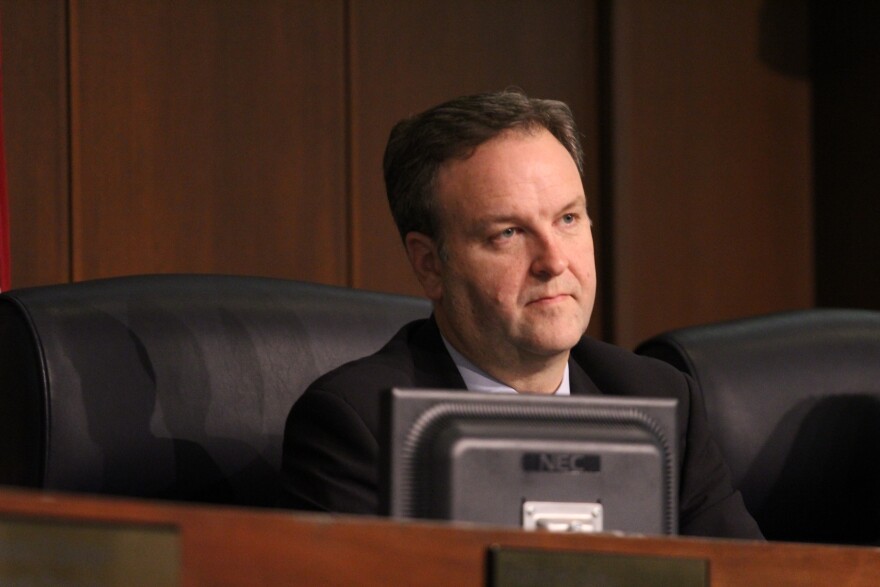With a statewide prescription drug monitoring program likely to run into intractable legislative opposition, the St. Louis County Council decided not to wait.
The council gave final approval without opposition to legislation that would set up a database tracking when certain prescription drugs are dispensed. It’s aimed at stopping someone from getting narcotics at multiple pharmacies.
Supporters of the database – including St. Louis County Executive Steve Stenger – have noted how prescription drug overuse is typically a precursor to heroin abuse. The Democratic executive signed the measure into law on Wednesday morning.
The issue is personal for Stenger, as his nephew died of a heroin overdose.

"I think it makes a huge difference," Stenger said. "Statistically, we see that four out of five heroin users start as opioid abusers. And so if we can curtail the abuse of opioids, it will lead to a reduction in heroin addition and heroin deaths. And I think that there’s empirical data to suggest that."
Missouri is the only state in the country that doesn’t have a prescription drug monitoring program. And St. Louis County Councilman Sam Page said that’s causing all sorts of problems around the state.
“[Missouri is] essentially referred to in law enforcement as ‘America’s drug store,’” said Page, D-Creve Coeur. “So we have people posing as patients coming in vans from other states into St. Louis County and into Missouri. They’re crossing Missouri at all borders and they’re pretending to have a serious medical illness that most reasonable physicians would think would require a narcotic medication, along with other treatments.
“So as these people that are hired by drug dealers posing as patients go from doctor to doctor in collecting narcotics, they turn those over to the drug dealers who put them out for street sales,” he added.
Page said a database will have “a dramatic impact on the diversion of street sales.”
“In an ideal world, we would cover the whole state or at least a metropolitan region,” Page said. “I know that other counties are looking at this. And I would expect them to eventually come aboard on their own timeline. But this is relatively new. No other county in the country has tried to establish their own prescription drug program, because it hasn’t been necessary. All the state legislators have pretty eagerly passed this and very promptly over the past decade. We’re the outlier here in Missouri.”
Unknown futures
The passage of St. Louis County's legislation comes as the Missouri House initially approved a bill establishing a statewide database. (Update March 3: The full House voted 87-66 in favor of a statewide database, sending the issue to the Senate.)

The bill’s sponsor -- Rep. Holly Rehder, R-Sikeston – cited her own experience growing up with addiction in her family. She said a prescription-monitoring program would have made it easier for her stepfather to access medical help.
“I was raised in addiction. I was raised with a step-father that was a drug dealer,” Rehder said. “I get it because I've seen it first-hand. Now, I understand buying pills on the black market. I get it. I have people in my family that do that. So, I wouldn't tell a physician how to be a physician. I've seen this firsthand. So perhaps it does make me a little more informed on how this works, on how this happens, and how the prescription pain killers do evolve into heroin or meth use."
But the bill has stalled for years, primarily because some GOP legislators like Sen. Rob Schaaf, R-Joseph, have raised alarm about the database’s potential impact on patient privacy. It’s highly likely Rehder’s bill will face a Senate filibuster unless the measure is put up for a statewide vote.

“As you know, the very first time that issue came up, I said I would gladly sit down if they would put it to a vote of the people. But they never do want to put it to a vote of the people and it’s really simple why: They know that the vote of the people would not support it,” said Schaaf. “It hasn’t been passed by the people in any state. And I suspect that it would be soundly defeated if it were put to a vote of the people in Missouri. And I think they know that.”
Schaaf said the passage of St. Louis County’s bill wouldn’t have any impact whatsoever on the General Assembly’s debate over a statewide database.
“And I’d be very surprised if the people of St. Louis County continue to support those county legislators that would vote to take away their liberty like that. If I were living there, I would very much oppose anybody who would do something like that – putting people’s information on a government database is not American at all.”
Shrinking window?
Before he was elected to the county council, Page served with Schaaf in the Missouri House. While Schaaf has been one of the strongest critics of a prescription drug database, Page said legislative opposition has grown in both of the General Assembly’s chambers.
“One senator has an impact. There are legislative ways around one senator. But I think it’s more than Sen. Schaaf,” Page said. “There are four or five senators now who feel very strongly about this. There’s a strong contingent in the House who feels strongly about this. I think that’s not representative of public opinion in Missouri on this subject. But it’s the decision that the legislature will have to make.”
In the meantime, Stenger said it’s possible that other surrounding jurisdictions –like St. Louis or St. Charles County – could opt in to the county database. He said the county's program should be up and running in about 90 to 180 days, and added he's hoping to get federal funds to pay for database's costs. (U.S. Sen. Claire McCaskill, D-Mo., is trying to amend a Senate bill so resources could be steered toward counties implementing monitoring programs.)
"We have received word from our larger jurisdictions surrounding us that they are contemplating passage of their own bill and either utilizing our database or having their own database," Stenger said. "But certainly there will be linkage among some of our regional partners."
And while Page doesn’t think the county bill will have an impact on the state debate this year, he added that the measure could be instructive.
“As we get up and running and start demonstrating the value of this program and as the deaths from overdoses drop in St. Louis County and continue to rise in the rest of the state, I think we’ll have our own Missouri example of why this needs to be statewide,” Page said. “And I would expect the legislature to eventually pass a [prescription drug monitoring program]. I don’t know if it will be in two years or five years or longer. But when they do, we’ll roll ours into the statewide database. And we’ll have a lot of experience on running a PDMP (prescription drug monitoring program) in Missouri.”





